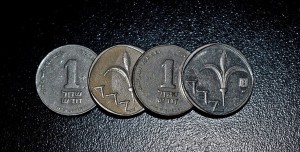At least three hundred such households can still afford to live and save for retirement.
 Jerusalem, February 14 – Officials at the Israel Tax Authority convened today to discuss disquieting reports that there still exist Israelis who have not had their income taxed enough to deprive them of economic security.
Jerusalem, February 14 – Officials at the Israel Tax Authority convened today to discuss disquieting reports that there still exist Israelis who have not had their income taxed enough to deprive them of economic security.
Authority Commissioner Sarai Missim summoned her deputies and the managers of the regional offices throughout the country for a two-day session to discuss alarming data indicating that outside the wealthy and well-connected, there still exists a middle class in Israel that not only nets enough money to meet expenses, but has actual disposable income.
The meeting resulted from a two-month period of analysis, at the end of which Missim received a report on the stubborn existence of such Israelis. According to Bureau of Statistics data, backed by tax reports, the exorbitant taxes on income, in addition to annual property rates, combined with stagnant wages, have failed to destroy the middle class entirely. While thousands of families who could once count themselves among the economically secure, if not the actual well-off, have descended deeper and deeper into an inability to meet expenses, at least three hundred such households can still afford to live, save for retirement, and even spend the occasional large sum on such luxuries as dinner at a restaurant or filling the car’s gasoline tank all the way.
“We can do much better,” asserted Missim in the notice to her deputies. “Once upon a time this country had only a handful of prosperous people, and rationing was the order of the day for everyone. Times have changed, and the growth of Israel’s economy over the last several decades has introduced the unwelcome phenomenon of many others being able to live comfortably. The tax policy we are charged with implementing and enforcing is intended to stem the cancerous growth of this so-called middle class, but despite our best efforts through successive administrations, we have been unable to stamp out this scourge. We must redouble our efforts to stifle individual prosperity. At this conference we will explore the ways we can improve enforcement of existing tax laws, but more importantly, which legislators and ministers we can prevail upon to levy new taxes. Much work remains.”
Prominent on the session’s preliminary agenda are ways to enforce collection of tax on “foreign passive income,” money earned through dividends or investments held abroad. Nominally the tax rate for such income stands at 25%, but Missim and her staff seek to change enforcement to focus less on annual collection of those taxes and more on letting Israelis – especially immigrants with assets still abroad – go for years without even being aware such a tax exists, then suddenly hitting them with hundreds of thousands of shekels in back taxes to both impoverish and demoralize them in one blow.
“Ideally we can force some of these relative newcomers to go back whence they came,” she explained. “It makes it so uncomfortable to have people around who know what a proper middle class lifestyle is supposed to be.”
Please support our work through Patreon.




